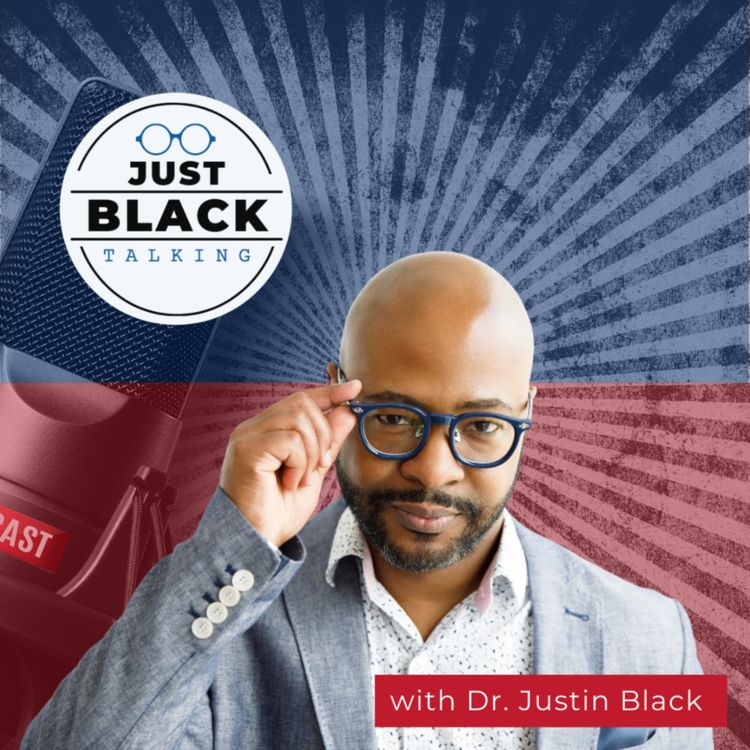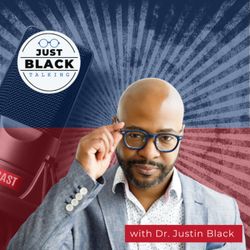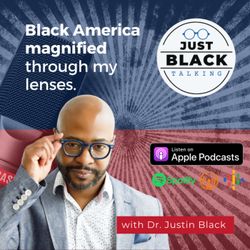Share

Just Black Talking
Tab Wolod | Grabbing Ourselves by the Bootstraps and Getting Us Out of the Mud
We have a special guest for today's episode during the National Minority Mental Health Awareness Month, Tabitha Wolod. Tab is the CEO of Ideas Equal Income, a creative agency built to help individuals, just as its name indicates, transform their ideas into income. She is also a Queer person of color, currently dealing with some mental health issues, and a huge advocate for mental health awareness.
Throughout our conversation, we navigate Tab's childhood traumas, her relationship with her parents, the different extreme and traumatic situations she was exposed to since she was a child, and how they developed all over her adolescence and early adulthood.
We talk about her coping mechanisms to deal with reality, her early introduction to nightlife, substance abuse, and promiscuous relationships with men and women.
In addition, we delve into the importance of seeking proper medical assistance, the dangers of misdiagnoses, and how her life changed after she got adequately diagnosed and medicated.
Some Questions I Ask:
- Could you talk about how old you were when mental disorders started to manifest and how that experience was? (8:34)
- Talk to us through what it looked and felt like; what were some signs and symptoms that things weren't in sync in your life? (15:10)
- What were you trying to do to cope during this period of chaos during your early 20s? (24:53)
In This Episode, You Will Learn:
- Tab's upbringing and the challenges she faced having a mother with multiple mental health issues (4:25)
- The lack of food restrictions at Tab's house and her struggles with poor nutrition (11:33)
- Tab's first experiences as being misdiagnosed with depression (18:59)
- Tab takes us through her traumatic experiences and poor choices in her early adulthood (20:14)
- How Tab's life changed after she got a proper diagnosis to deal with her mental health issues (32:51)
Resources:
- Ideas Equal Income website
- Book: Bessel Van der Kolk - The Body Keeps the Score: Brain, Mind, and Body in the Healing of Trauma
Connect with Tab:
Let's connect!
More episodes
View all episodes

Amber Fields | The Audacious CEO Who Disrupted Tech and is Changing the Face of UX
43:13|Only %7 of tech talent is Black. If we look at UX (User Experience) talent, that number goes down to 3%. Still, those numbers become harder to accept once we learn that those percentages haven't changed in the last 50 years. Considering tech's explosive growth in the last decades, the lack of change in the industry's representation can't be fortuitous.The way our guest, Amber Fields, knew about this data was rather accidental. Still, the ideas she developed and her actions to defy the status quo and disrupt the narrative about inclusion in the tech industry once she got access to this information were very intentional. Amber Fields is a Researcher, Storyteller, Speaker, DJ, and Founder of Black UX Labs, a coaching and consulting firm for black UX talent. She is passionate about promoting, including, sponsoring, and enticing audacity among Black and Brown talent in the tech industry. In this episode, Amber kindly describes her path from marketing and advertising to the tech and UX industry. We talk about the alarming disparity in representation in the industry and the C-Suite level of leading corporations. Amber explains the importance of getting more Black feet into the UX industry from an inclusiveness standpoint and a commercial and financial perspective. We also reflect on the need to create an audacious mindset within the Black and Brown community to face the "caucacity," Amber reveals the only factor capable of affecting and changing the tech and UX industry, and she shares advice for young folk who want to start their careers and aren't sure of where to start from. Some Questions I Ask:Could you give us a little background on UX (user experience)? (2:24)Let's talk about the representation in this community, not marketing and advertising, but in the tech community. What can you tell me about that? (6:57)We are often afraid when people start talking about leaving the plantation. When you began with Black UX Lab, did you encounter much resistance? Were people suspicious of you? (21:19)In This Episode, You Will Learn:Amber shares her story in marketing and advertising and her original goal of joining that industry (4:54)Amber talks about how and why she started connecting with people who looked like her in tech. The birth of the Black Tech Book (9:18)Amber shares her realization of the need to hold the budget to generate a substantial impact in the industry (13:07)Amber talks about the moment she felt the need to disrupt the industry's narrative and challenge the status quo (15:41)Amber explains why inculcating audacity among Black and Brown communities is essential (18:04)Amber talks about how she feels she contributes to changing the perception of Blackness in the tech space (28:38)Amber unravels the importance of including Black and Brown talent in UX to enhance inclusion but also to generate more revenue (31:04)Resources:Black UX Labs websiteBlack UX Labs InstagramConnect with Amber:LinkedIn
The Structural Issues America's Formula Shortage Uncovered with Heather Cabral
46:40|The bacteria contamination detected last February at the Abbot Corporation, one of the four major formula producers in the country, forced the plant to shut down. This had a massive impact on the supply chain that directly affected the parents dependent on formula to feed their babies. Still, the current formula shortage America is going through is just the tip of the iceberg. The issue revealed significant failures in our healthcare system, like defective parental leave politics and the Government's null assistance in setting families for success the moment a baby is born.To give us a deeper look at these issues is Heather Cabral, Managing Director of Communications at Faith in Action, the nation's largest faith-based grassroots organizing nonprofit in the US. She is also the creator of Mama Milk Bank, a space where parents in need of human milk can connect with and get information from milk donors and milk banks. Our conversation revolves around Heather's hereditary drive to fight for what is right, the importance of donating milk, the lack of time, space, and accommodations for mothers to pump milk at work, and how flawed is our healthcare system in this regard. We also delve into the impact these failures in the healthcare system have on Black and Brown women, the costs of donating milk, and Heather's project Pump-A-Thon, a 30-day campaign encouraging women to "pump and donate" breast milk. Some Questions I Ask:After what happened with the Abbot Corporation in February, tell us how this evolved for you (9:13)Could you talk a bit about the process of creating Mama Milk Bank? (24:49)What is the cost to moms reaching out to those banks? (40:43)In This Episode, You Will Learn:Heather shares a bit about her background and her fighting for what's right heritage (2:55)A bit of background on the formula shortage (6:13)About the lack of accommodation and time for mothers to pump and store their milk at work (14:31)Parental leave: the root of the problem that formula shortage highlighted (16:26)A band-aid on a bullet wound. The Mama Milk Bank project and its temporary solutions (30:19)The impact of corporate greed on Black and Brown mothers (35:27)Heather provides details about Pump-A-Thon (42:17)Resources:Mama Milk Bank LinktreeConnect with Heather:TwitterLet's connect!WebsiteInstagram
The Recipe for Success with Sheenee Cotton
55:28|Growing up in a single-parent, low-income household, Sheenee Cotton experienced first-hand the struggles and sacrifices her mother would make to provide for her and her brother. Compelled by the urge to relieve her mother's burden, Sheenee made a snowball stand one summer and used the money raised to buy school supplies and back-to-school clothes. Fast forward some years, seeing her grandfather struggle with health issues and watching a disturbing documentary about what's in the food we eat set a new mission in Sheenee's path. She couldn't stop thinking of the link between nutrition and the illnesses that run in her family, the Black community, and the ones her grandfather struggled with. She adopted a plant-based diet and decided to make the Black community aware of the food they put in their bodies and help them improve their eating habits.Sheenee Cotton is the Founder and Ceo of Cotton Creations, a YouTube sensation, Creator of the Vegan Dining Experience, Inventor of the Ponytail Sleeve, and an inspiring omnipreneur. She shares vegan recipes and cooking tutorials, haircare and fashion advice, and DIY projects on her YouTube channel. We delve into Sheenee's story, her entrepreneurial spirit, her path through college, and the decision of starting a YouTube channel to increase awareness in the Black community about food, which pivoted into a company born to change perceptions about eating habits and Blackness in America. We talk about how the pandemic affected Cotton Creations, her relentless drive to put her ideas out in the world, do extraordinary things like writing her own patents for her products, and sell them to retailers like Walmart and Uplift Us Marketplace. Some Questions I Ask:Tell me a bit about who you are and where you're from? Then walk us through the period from leaving Maryland to going out there and to California, where you are now. (4:42)Tell us some of the main focus and some of your first endeavors on the route to establishing Cotton Creations. (9:55)How did you determine veganism was the direction as opposed to "I'm just gonna watch what I eat", or vegetarianism, or pescetarianism? (13:52)In This Episode, You Will Learn:What motivated Sheenee to start thinking seriously about what she was putting in her body (10:03)Doing research and writing patents. Sheenee talks about the process of selling her products to retailers (18:56)Creating recipes around accessible ingredients for the Black community (27:01)Sheenee talks about his dynamic approach to business and her ability to focus on more than one project at a time (42:49)Shifting perceptions. Sheenee explains how she uses her business to change perceptions about Black people inside and outside of the Black community (47:18)Resources:Cotton Creations websiteCotton Creations YouTube channelCotton Creations InstagramConnect with Sheenee:InstagramLet's connect!WebsiteInstagram
Having a Solution-Based Mindset with Aaron Maybin
53:22|A successful Black professional NFL player, who has never been a character issue nor was never involved in any kind of trouble, is definitely an inspiring story for Black youth. It is a positive representation; it's showing them, Black kids, that people who look alike are capable, deserving, and creators of their own success against all the odds.However, if we think of legacy and true impact, that is not enough. At least, that's how our guest, Aaron Maybin, sees things.Aaron Maybin is a former NFL superstar, drafted as the 11th overall pick by the Buffalo Bills in 2009, where he played for two years before signing for the New York Jets, where he played another two years. In 2013, after being signed by the Cincinnati Bengals in a Reserve/future contract, Aaron decided to retire from professional football.Aaron's family recognized his dominant and promising sports abilities when he was growing up, but without ignoring his other talents, instilling him an interest in the arts. This passion, which he used as a coping mechanism to deal with his mother's loss, would conspire many years later to help him have a clear vision of the path he would walk in his post-football life.Today, he is a Professional Artist, Author, Educator, Community Organizer, and Art Activist. He is a Baltimore Arts Realty Corporation executive board member and a member of the newly appointed Mayor's Transition team, serving on the Arts & Culture Committee. His first book, Art Activism, is being taught as a Masters of Fine Arts course at Maryland Institute College.We delve into Aaron's transition from an elite athlete to a professional artist and educator and his decision to stop playing professional football in his prime. We talk about his drive to be an uplifting and inspiring figure for the Black community, his passion for empowering others, arming them with artistic resources, and instilling a solution-based lifestyle instead of a deficit-based mindset. Aaron also shared his thoughts on toxic masculinity, the limitations and restrictions of the creative sector in our school system, and more.Some Questions I Ask:Your passion for art: How did that play into the decision to walk away from professional football? (8:47)Tell us about what it's like to be in your community, and the work with kids you do there (27:50)In This Episode, You Will Learn:Aaron's experiences growing up and the importance of his family incentivizing him to multiply his interest in many things other than football (4:31)Art was a coping mechanism. Aaron talks about his early and deep connection with arts (10:32)Finding a proper use of social media. The contrasting difference between the Buffalo Bills and the NY Jets (18:31)What is Art Activism (31:19)Toxic behavior is genderless. The myth of toxic masculinity and its effects in young kids (43:43)Connect with Aaron:websitebooks and education toolsInstagramTwitterYouTubeLet's connect!Website
Protecting Those Who Protect Us with Jonathan Tate
51:31|The demands of firefighting go way beyond the physical element; firefighters on duty barely stop to rest for longer than a few minutes. They run several calls per hour, have their adrenaline constantly fluctuating leading to demands on the heart akin to a never ending interval training. This strenuous job's primary victim is firefighters' hearts; greater than 44%, the leading cause, of all firefighter line-of-duty deaths are from a heart attack.In 2015, Lieutenant Kevin McRae was the 100th DC firefighter to die in the line of duty after 26 years of service at the young age of 44. As Mayor Bowser called it, the "loss of a hero" impacted his family, the DCFD, and the community, but it was also triggered the foundation of a genuine passion project of love, service, and giving. The death of Lt. McRae instilled in our guest, Jonathan Tate, a second-generation firefighter himself, who also ultimately lost his father due to a heart condition, the urge of doing something to improve firefighters' lives. One of the first things Jonathan noticed when he joined the DCFD in 2012 was the lack of attention firefighters were putting into their nutrition. He started the nonprofit organization Food On The Stove, which helps firefighters live a healthier lifestyle through enhanced nutrition and exercise.In this episode, we get a closer look at Jonathan's inspired, visionary, and aspirational project, Food On The Stove. Food On The Stove not only proportions healthy food choices for firefighters but also educates them on healthier lifestyle choices. Jonathan's project added chefs and nutritionists into Fire Station houses, performs blood work, and runs prospective studies to measure the impact of healthier nutrition choices on the decrease of medication and the increase of firefighters' overall health. Tune in and delve into the details of how this inspiring story started and the benefits it has brought to the DC firefighting community so far. Some Questions I Ask:You mentioned you’re a native Washingtonian, but let's start with what got you into firefighting (6:53)Could you give us a sense of a firefighter's typical shift? (14:49)Tell me about Food On The Stove. Tell me about the name and significance of that name and the goals and objectives (20:53)In This Episode, You Will Learn:Jonathan talks about his relationship with Davon McRae, Lt. McRae's son, and the creation of the Lt. Kevin McRae Memorial Gym at Engine 6 in the DCFD (9:50)About firefighters' broad spectrum of obligations when on duty (15:35)How Food On The Stove started for Jonathan (22:16)Most of us take fire stations for granted. Jonathan talks about the importance of taking care of firefighters' overall health (31:51)Resources:Food On The Stove websiteFood On The Stove InstagramFood On The Stove YouTubeFood On The Stove TwitterConnect with Jonathan:LinkedInLet's connect!WebsiteInstagram
Meeting the Georgetown Butcher, Wendell Allsbrook
55:53|In the heart of Georgetown, a city with a complex history with African Americans, a small business stands out not only for being one of the few Black-owned businesses in the area but because of the moment it was founded and the uniqueness of its owner, Wendell Allsbrook. Wendell Allsbrook grew up in a rough environment, surrounded by the wrong crowd, which led him to make dumb decisions during his teenage years, like dropping out of school. However, thanks to his ambitious mindset, the certainty that he could do more, and against all odds, he managed to open his own business. The week Wendell opened his butchery, the world shut down due to COVID, forcing him to roll up his sleeves, double the efforts, and go through an accelerated course in entrepreneurship. However, as if building a successful business during the pandemic wasn't worthy enough, he managed to create an extremely personalized business born in the detached space of contactless delivery and online shopping. In this episode, I have the pleasure of chatting with Wendell Allsbrook, Founder and Owner of Georgetown Butcher. We delve into Wendell's past, his experiences growing up in the U St. corridor of NW Washington, DC during its rough, declining years, and his relationship with the school, his family, and the environment he was surrounded by. We talk about his drive to be successful and owning his own butcher shop, how he dealt with facing the pandemic right after opening his business' doors, and why he decided to approach that challenge the way he did. We also talk about his future projects in his shop, the products they offer, his relationship with the neighborhood, and more. Some Questions I Ask:Can you please introduce yourself and tell the people what you're all about? (9:15)How did you get into butchery? (10:03)What was going through your mind when you opened your business, and the world shut down? (19:08)In This Episode, You Will Learn:A bit of context about Georgetown's history with African Americans (3:08)About Wendell's rough childhood and his decision of being around the wrong crowd (11:18)Just use common sense. Wendell talks about how he managed to differentiate by creating a personalized business (26:36)The importance of working with local farmers (30:03)About Wendell's decision of educating himself in trains and buses going and coming from work every day (46:18)Resources:Georgetown Butcher websiteGeorgetown Butcher Instagram
Learning A Proper Way to Exercise Our Second Amendment Rights
01:19:35|Although we are used to experiencing the same tension in the air during every presidential election where one side of the political spectrum feels they need guns, that changed in the 2020 elections. During the last election, the tension and the interest in owning guns was a common concern on both sides and particularly, in the Black community. Joining me today is Kris Walcott, Owner and Lead Instructor of Prolific Operations Training Group. At Pro Ops, Kris and his team's mission is to provide a solid foundation for new shooters and proficiency for experienced shooters. Every instructor at Pro Ops is credentialed and licensed by the State of Maryland. Throughout this episode, we discussed the necessity of owning guns and the importance of qualified and responsible firearms ownership in our homes. Kris shared some insights about what he considers an awakening of Black people acknowledging their entitlement to owning guns. We went through the kind of training Kris and his team offer, the difference between types of guns, factors affecting the amount of guns people own, and the importance of training and mental preparation for the correct use of firearms. Kris also talked about his goal in the industry: providing value and turning himself into a resource for the community, where people can ask questions about guns, learn, and be prepared in case they need to use a weapon. Some Questions I Ask:What types of certifications or training do you offer? (5:33)How did you engage the African American community initially? (6:94)Why didn't the perceived threat translate to gun ownership in Black communities in the past? (20:34)I don't want a gun because I don't want to live in fear, the fear of someone coming after me or breaking into my home. How do you respond to something like that? (28:02)What do you think is the role of Black-owned ranges and gun shops? (49:53)In This Episode, You Will Learn:Answering the call. Kris talks about the 'awakening' of Black people and their desire for gun ownership (9:48)The impact of social media on gun ownership (15:07)The importance of working with mental scenarios to be always ready (25:01)Why responsible and trained gun ownership is so important (30:49)The best ability is availability. Kris talks about how crucial it is for gun owners to be physically and mentally prepared to use a gun (56:22)Resources:Prolific Operations Training Group websiteProlific Operations Training Group InstagramProlific Operations Training Group Facebook Let's connect!WebsiteInstagram
The Place Where Passion, Knowledge, and Happiness Meet to Enjoy a Glass of Wine
54:37|Although she felt like a small fish in a big pond when she moved from Nashville, Tennessee, to study at the University of Pennsylvania, Jai Jai did pretty well. She delivered the class commencement speech at graduation, and she was the recipient of the Althea K. Hottel award, the highest honor given to a female graduate. After graduating in Economics and while she was doing her Master's in Business at Northwestern University, Jai Jai started an internship at Goldman Sachs. Later on, she worked at Morgan Stanley, managing trading and business development. She loved the energy and the pace of that room we usually see in movies full of traders yelling at each other, holding a phone between the cheek and the shoulder while taking notes. Jai Jai was doing great in her professional life, but she felt something was missing. I'm joined by Jai Jai Greenfield; she is the Managing Director at The YN Group, Inc, the first mobile platform for wine retailers. In addition, Jai Jai runs Wine Down, her happy place. Wine Down is a retail company built for the new normal, where Jai Jai channels her passion, knowledge, and energy about wine to create a collection of cool and fun wine accessories and gifts.We talked about Jai Jai's journey from working on sales and trades on Wall Street, her first entrepreneurial endeavor in Harlem, closing her business, and then taking some detours and finding herself opening a new business again. She shared her incredible energy talking about partnerships in business, failure, success, Black representation in the wine industry, and much more. Some Questions I Ask:You say you wish you had maybe majored in something that spoke more to you; what kind of things are coming to mind? (7:23)What do you think you're going to do with yourself coming out of business school? (12:21)What gave you that confidence wanting to go into a store for wine, not liquor? (19:27)What was it like for Black wine producers to see you coming along with your wine store? What was that interaction like? (29:48)In This Episode, You Will Learn:Jai Jai's journey from Wall Street to entrepreneurship (8:36)What 9/11 produced in Jai Jai's mindset and what decision she made after that (14:28)Why Jai Jai decided to open a wine store in Harlem (17:49)Helping Black wine producers get visibility (28:39)Jai Jai talks about her work at MLT Management, Leadership for tomorrow (49:07)Resources:Wine Down websiteWine Down InstagramWine Down FacebookWine Down TwitterConnect with Jai Jai:LinkedInLet's connect!WebsiteInstagram